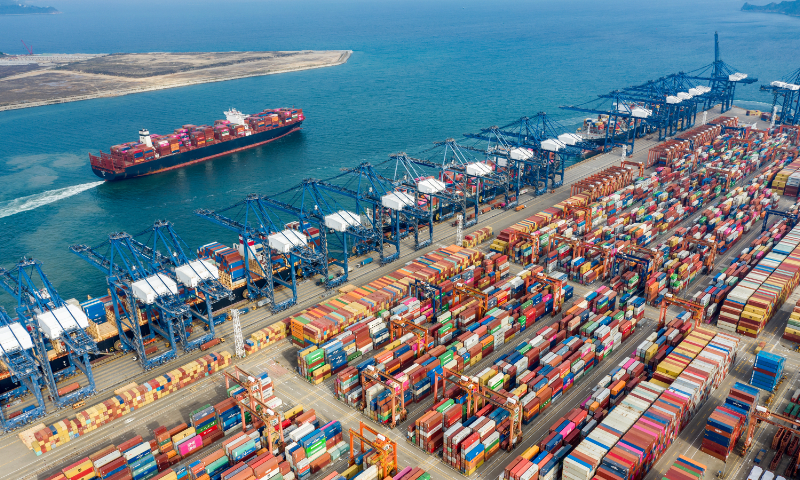Chinese local economic powerhouses go all out in boosting foreign trade, investment

Containers pile up at the busy Yantian Port in Shenzhen, South China's Guangdong Province. Photo: VCG
As China further optimized its COVID-19 prevention and control measures and eyes an overall improvement in economic operations, local economic powerhouses from East China's Jiangsu Province to South China's Guangdong Province are taking a diversified set of measures to boost foreign trade and investment.
The moves, including holding trade and investment promotion activities and sending business delegations overseas to secure orders, will help these regions get off to a great start in terms of economic recovery next year, which will help boost the overall improvement of the national economy, observers noted.
In Guangzhou, provincial capital of Guangdong, the 2022 Global Investment Promotion Conference for the Guangdong-Hong Kong-Macao Greater Bay Area kicked off on Wednesday. As the first such conference in the Greater Bay Area aiming to show investment opportunities to the world, the event attracted 300 multinational companies, and over 850 cooperation projects were reached with a total investment of 2.5 trillion yuan ($358 billion), according to Shanghai Securities News on Thursday.
The conference was jointly held by the provincial government of Guangdong and the governments of the Hong Kong and Macao special administrative regions.
In Suzhou, a major city in Jiangsu, a business delegation had recently returned home after a 10-day journey in Europe to secure orders. The delegation visited 325 enterprises and institutions, and reached a total of $5.954 billion of intended investment, according to a report on a local official website.
Meanwhile, another delegation consisting of 12 teams and 51 company executives from Suzhou went to Japan from November 17 to 23. The delegation visited 62 enterprises and institutions, securing intended investment of $1.86 billion.
Similar business delegations from other provinces, including Guangdong, Zhejiang, Fujian and Sichuan, have also gone to other countries recently to secure orders and attract investments, a move believed to help strengthen the trust of foreign businesses in China's economic development and foreign trade.
In addition, some localities are also using online meetings to make communications with overseas business partners more convenient and efficient. For example, the 16th Singapore-Jiangsu Cooperation Council meeting was held via video link on Wednesday to boost cooperation.
Economic cooperation between Singapore and Jiangsu have seen steady growth, with two-way trade growing 12.5 percent year-on-year to $12.8 billion in the first three quarters of 2022, the Straits Times reported, citing an Enterprise Singapore statement. During the period, Singapore's direct investments into Jiangsu amounted to $2.1 billion, which surpassed the full-year figure of $1.4 billion in 2021, the report said.
Coastal regions will see a good start in terms of foreign trade in the first quarter of next year given such active measures and the support of local governments and the central government, Tian Yun, former vice director of the Beijing Economic Operation Association, told the Global Times on Thursday.
Tian said that coastal regions still have advantages in the world in industries such as new energy and information technology.
The efforts to attract foreign investment comes as China optimized its epidemic prevention and control measures, and the just concluded tone-setting Central Economic Work Conference also called for greater efforts to attract foreign capital and widen market access.
During the January-October period of 2022, the actual use of foreign direct investment in China expanded to 1.09 trillion yuan, a year-on-year increase of 14.4 percent, data from the Ministry of Commerce showed.
The continuous inflow of foreign capital shows a higher level of connection between China and the world, in stark contrast to the US' push for "decoupling," Tian added.
China will open its door even wider to foreign investment next year and improved epidemic prevention measures have created more positive factors for foreign investors to expand in China, Bai Ming, deputy director of the international market research institute at the Chinese Academy of International Trade and Economic Cooperation, told the Global Times on Thursday.
"The easing COVID measures will make it easier for foreign investors to come to China for on-site inspection," Bai said. "This is a win-win situation. We need foreign technology to help relevant industries in China improve their status in the international division of labor, while foreign companies need to tap into the massive Chinese market," he said.
China's foreign trade grew 8.6 percent year-on-year in the first 11 months of 2022 despite mounting challenges such as weak overseas demand, growing geopolitical tensions and COVID-19 resurgences.

